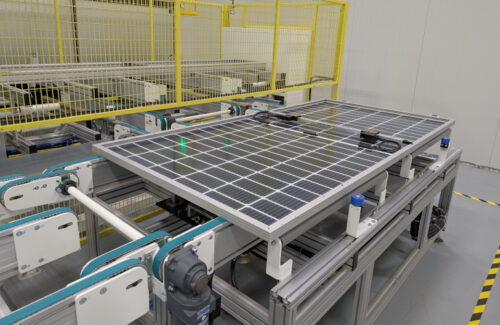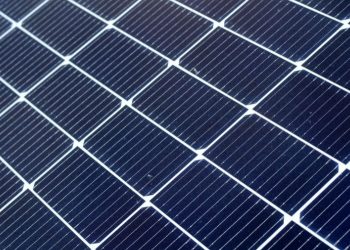Boviet Solar held a celebratory ribbon-cutting this week for its 2-GW solar panel assembly facility in Greenville, North Carolina. The plant, which started fine-tuning its lines a few weeks ago, was touted as a manufacturing success story for eastern North Carolina by the many local and state representatives in attendance, as well as Democratic state Gov. Josh Stein. Also in attendance were Boviet’s global general manager Zhaochun Xie and Sienna Cen, president of Boviet Solar USA.
The panel factory, which has already hired 370 employees, will make both mono- and bifacial solar panels for the U.S. market. Combined with generous state incentives, Boviet invested nearly $300 million to renovate an existing 521,460-ft2 building in Indigreen Corporate Park. The company is also building a second 500,000-ft2 factory next door that will manufacture 3 GW of solar cells annually. Boviet has broken ground on the cell factory and plans to begin production in the second half of 2026. When both campuses are finished, Boviet says it will employ 1,300 people in Greenville.
I wish I could say more about my visit to the panel factory, but it’s surprisingly getting routine — never thought I’d say that, reporting on the U.S. solar panel manufacturing market. The assembly lines were running, and the employees knew their roles. Things are already looking like a well-oiled machine, and that’s all you can ask for as the United States quickly scales its solar manufacturing capacity.
I talked to many EPCs and installers in attendance at the ribbon cutting, and they all said the same thing: Boviet is a consistent and reliable company that they have built great relationships with. They’re excited for this new factory in the United States, but they’re more excited for the cell factory to get going so they can access additional domestic content incentives.
Boviet Solar was founded in Vietnam in 2013 and currently supports a cell and panel manufacturing outfit there. Although not founded with Chinese ties, Boviet is now a subsidiary of Chinese materials manufacturer Ningbo Boway Alloy Materials Co. About a dozen Boviet hires from Greenville went to Vietnam for six weeks to learn the assembly line operations. Many of those supervisors and operators led tours of the in-production factory during the ribbon-cutting event.
The current solar panel factory was once home to DENSO Manufacturing, which made engines for windshield wipers, electronic windows and other car components. When the company left Greenville in 2023, 475 people lost their jobs. Boviet is committed to investing in the Greenville community and hired many of those former DENSO employees. With even more employees needed for the cell manufacturing plant, Boviet will have a major presence in the city.
The United States is clamoring for domestic solar cells, and Boviet will benefit from its own domestic supply. Boviet’s Vietnamese solar panels were excluded from tariffs initiated in the first AD/CVD case on Southeast Asian solar imports in 2023, but the imports will be tariffed under the second AD/CVD round. Commerce just announced its final tariff amounts, and Boviet’s Vietnamese cells and panels face a 307.78% tariff. That means that the cells Boviet imports from its own factory in Vietnam for panels being assembled in North Carolina will have a higher tariff than most. The second half of 2026 can’t come soon enough.



















